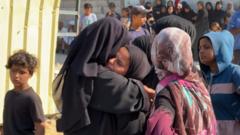International editor Jeremy Bowen reports from Jerusalem on the complex humanitarian crisis in Gaza, emphasizing that while air drops may seem like a quick fix, they fall short of addressing the root causes of starvation and suffering.
Gaza Humanitarian Crisis: Air Drops of Aid Criticized as Ineffective Solution

Gaza Humanitarian Crisis: Air Drops of Aid Criticized as Ineffective Solution
In the wake of increasing global outcry, Israel proposes air drops as a means to provide aid to Gaza, but experts warn it may not alleviate hunger.
In a bold response to mounting pressure from Western allies, Israel has signaled its willingness to conduct air drops of humanitarian aid into Gaza. This is primarily a symbolic gesture aimed at blunting accusations from nations like Britain, France, and Germany, who are condemning Israel's role in escalating the hunger crisis in the region. On July 25, senior government officials in these countries urged Israel to lift restrictions on aid, allowing humanitarian organizations to address the dire situation in Gaza, as required by international humanitarian law.
However, Israel maintains that it does not restrict aid trucks from entering Gaza, a standpoint that has been widely scrutinized by allies and organizations operating in the territory. Despite this assertion, the United Nations and several NGOs have voiced serious concern over access constraints. The call for aid is underscored by alarming statistics indicating that nearly a third of Gaza's residents are going without food for days.
Reflecting on past conflicts, Bowen notes that air-dropped aid is often seen as a final resort when traditional supply routes are blocked. He recounts experiences from previous humanitarian crises, revealing that while aerial deliveries may capture media attention, they are fraught with risks and logistical challenges. Air drops can lead to chaotic and dangerous situations, and the aid often lands far from where it is genuinely needed, with desperate individuals fighting over sparse resources.
A more effective long-term solution for alleviating hunger in Gaza, as Bowen advocates, would require a ceasefire and a sustainable, unrestricted aid strategy. Established supply lines, such as Israel's Ashdod port and borders with Jordan, demonstrate that alternatives exist beyond air drops.
As hundreds of thousands of Palestinians find themselves in overcrowded conditions along Gaza's southern coast, the challenges of deploying aid effectively become increasingly apparent. The harsh reality is that while air drops might provide temporary relief, they cannot substitute for coordinated humanitarian efforts. The call now is for comprehensive measures that would genuinely address the dire needs of the people of Gaza.



















